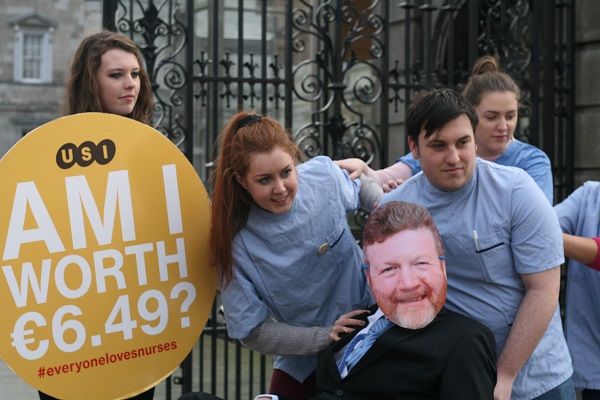The Irish Nurses and Midwives Organisation (INMO) will stage a protest outside Leinster House on September 27th following the government’s decision not to extend incremental credit to nurses who completed their internship between 2011 and 2015.
Last December, as part of the agreement signed between INMO, the Psychiatric Nurses Association, SIPTU, the HSE and the Department of Health, it was agreed that nursing internships between 2011 and 2015 would be recognised when placing newly-graduated nurses on a pay scale. This agreement also led to an increase in nursing internship pay from €6.49 to €9.48, which came into effect in February of this year.
In February, however, the Department of Public Expenditure and Reform subsequently withdrew the part of the agreement that would see the incremental credit being backdated to the 3,000 students who graduated between 2011 and 2015. The agreement now only apply to graduates from 2016 onwards.
While a review of the decision has been promised for 2017, the organisation is calling for a more immediate rethinking of the decision.
Speaking to The University Times over email, Student Officer of INMO and organiser of the upcoming protest, Dean Flanagan, said: “Interns from this year onwards will benefit from the increase in pay and also the recognition of incremental credit, which will mean that when they complete the year, they will be on one extra increment than anybody who graduated from 2011-2015.”
Flanagan said this leaves those previous graduates “in a position where they will be earning less than their colleagues [previous to] 2011 and now less than some of the new graduates come December”.
The Irish internship is recognised in the UK, and if Irish nurses work there and later return home, their nine-month internship is recognised by the Irish system, allowing them a higher rate of pay than if they had never left the Irish health system.
Flanagan believes this latest decision will force nursing graduates to take their expertise and training abroad, adding that it “would be a great loss of expertise in the HSE that is already struggling to retain nurses and midwives due to the global demand for the profession”.
Flanagan said agency costs in the HSE are “massive”, adding that “retention is needed to further reduce the requirement for agency nurses as well as overtime”.
Nursing agency costs have risen in recent years. According to Flanagan, the cost of agency was €86 million in 2013, increasing to a peak of €101 million in 2014. These costs declined slightly to €90 million in 2015. Flanagan added that he believes an “increased retention would also allow the health system to better plan and have an effect of reducing bed closures”.
The protest against the decision comes ahead of the HSE’s Winter Initiative, which will attempt to manage the upsurge in patients during the winter months. The decision not to backdate nurse’s incremental credit comes at a time when the risk of “staffing shortages and bed closures is serious”, according to Flanagan.
In July, it was announced that, following lobbying from INMO, all student nurses are to be offered hopsital posts by the Department of Health following graduation. For years, the organisation has campaigned to secure permanent hospital posts for all graduates, especially in recent years as the public sector has faced a severe shortage of nursing staff.







